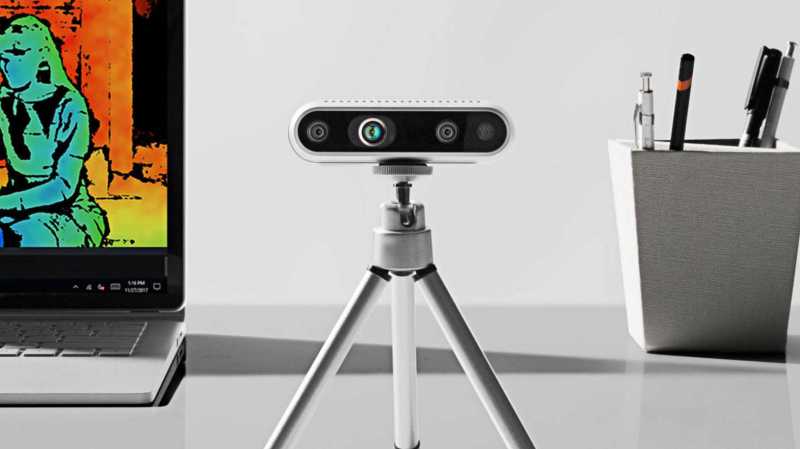We love depth-sensing cameras and every neat hack they enabled, but this technological novelty has yet to break through to high volume commercial success. So it was sad but not surprising when CRN reported that Intel has decided to wind down their RealSense product line.
As of this writing, one of the better confirmations for this report can be found on the RealSense SDK GitHub repository README. The good news is that core depth-sensing RealSense products will continue business as usual for the foreseeable future, balanced by the bad news that some interesting offshoots (facial authentication, motion tracking) will be declared “End of Life” immediately and phased out over the next six months.
This information tells us while those living out on the bleeding edge will have to scramble, there is no immediate crisis for everyone else, whether they be researchers, hobbyists, or product planners. But this also means there will be no future RealSense cameras, kicking off many “What’s Next?” discussions in various communities. Like this thread on ROS (Robot Operating System) Discourse.
Three popular alternatives offer distinctly different tradeoffs. The “Been Around The Block” name is Occipital, with their more expensive Structure Pro sensor. The “Old Name, New Face” option is Microsoft Azure Kinect, the latest non-gaming-focused successor to the gaming peripheral that started it all. And let’s not forget OAK-D as the “New Kid On The Block” that started with a crowdfunding campaign and building an user community by doing things like holding contests. Each of these will appeal to a different niche, and we’ll keep our eye open in the future. Let’s see if any of them find the success that eluded the original Kinect, Google’s Tango, and now Intel’s RealSense.
[via Engadget]
















Bugger, I was expecting to use a RealSense one day soonish – basically as soon as I needed either more compact or better data than the old kinect can manage, or the price dropped enough to make the upgrade really worth it…
Well all hail whatever ends up being the next goto option…
Intel ensured us that they are going to continue with the production of the current 3D cameras. (Currently in development of a product based on the Realsense camera)
Can you share this assurance from Intel? Love to see something better than the CRN article (first link in post) or the GitHub README (second link)
I wonder if this was being used by some of the Vtubers with better tracking. If so the timing might be bad for marketing even if there’s a replacement coming.
This sucks. I have a ton of different Realsense cameras. Most are so-so (300 series, 400 series), but the L515 LiDAR is spectacular. The ROS support is pretty bad though. I guess I’m out of luck.
I wonder if at some point, cancellations like this will start to undermine even early adopter’s interest in new tech. I’ve stopped using any new Google services after several I had adopted were abruptly canceled. Haven’t upgraded my phone in years since OS updates are a crap shoot at best. I had been interested in these and those Lytro cameras, but could neve get over my concern that this exact situation was likely.
I get that a company can’t support a product indefinitely, but there’s definitely a sense that the line between buying a retail product and being a paying beta tester has blurred.
You are absolutely right my friend!
Absolutely. Google has burned many, many people. Intel is doing the same. Someone has a vision for a really cool product, then it isn’t making enough money fast enough so they kill it. There are some serious soft damages to these companies that the bean counters are not considering.
Oh certainly.. theres a massive group of people that post in various groups about specifically not using tech that google announces for this reason alone. ..and of course theres all the communities that (rightly) mourn when their fave tech startup gets bought by google, since they know that means whatever they are currently enjoying will soon be EOL and intentionally killed.
Hey Joel,
We got our start here on Hackaday. We make an open source platform that has depth sensing, real-time AI, accelerated CV, and the capability to handle high-res/high-framerate sensors that many past-RealSense customers seem to be coming to quite a bit.
https://hackaday.io/project/163679-luxonis-depthai
So we’re happy to help. Actually I just answered another RealSense customer who is moving to our platform, here:
https://discuss.luxonis.com/d/293-intel-winding-down-realsense/7
Cheers,
Brandon
Luxonis \\ OpenCV
I used multiple time realsense cameras and always got disappointed (many bugs, the worst was an implementation error of the distortion on the l515 that took them multiple months to correct after report on github).
The specs and functionalities of Oak-1 and Oak-D seem awesome (especially lossless crop and inference on device), so I’ll probably try it for next project.
But I was wondering if the lossless crop functionality is only available on Oak-1 (as stated on the mouser page) or if it’s also available on Oak-D.
Do you have any time-of-flight laser systems? I need to semi-accurately take measurements of an interior space. RTABMAP (or similar) is also necessary. I need to make an exportable point cloud map. I would be interested in seeing what you have if you want to contact me.
Theres also Ultraleap, the products that LeapMotion turned into. They make some great motion trackers.
Fair enough,
Intel no longer makes sense for me…
There are other players out there like Orbbec3D. They have well priced sensors with Sdk.